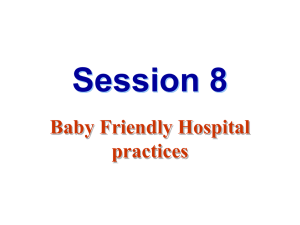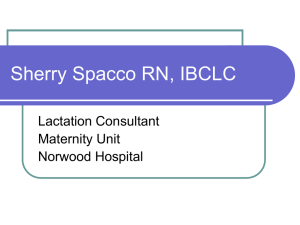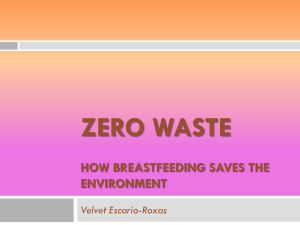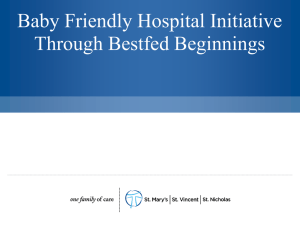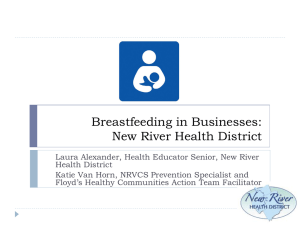S. Sosnowski Presentation - Westchester Medical Center
advertisement
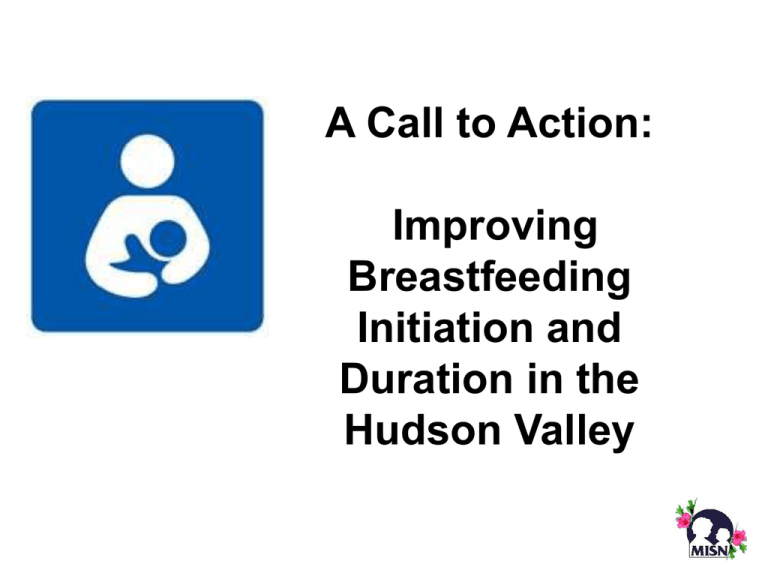
A Call to Action: Improving Breastfeeding Initiation and Duration in the Hudson Valley Stephanie Sosnowski Deputy Director, Maternal-Infant Services Network Chair, New York Statewide Breastfeeding Coalition Disclosure: I have no actual or potential declarations to make in relation to this program Maternal-Infant Services Network www.misn-ny.org Objectives • Describe NYS DOH Breastfeeding Promotion Initiatives • Describe how to increase breastfeeding in the Hudson Valley, including cesarean birth mothers Maternal-Infant Services Network www.misn-ny.org Breastfeeding: A National Public Health Priority CDC 2007 National survey: MPINC Maternity Practices in Infant Nutrition and Care Maternal-Infant Services Network www.misn-ny.org 2007 Breastfeeding Rates (%) 90 80 70 60 50 40 30 20 10 0 NYS National HP 2010 Ever BF 6 mos. 12 mos. Exclusive at Exclusive at 3 mos. 6 mos Source: CDC, NIS, provisional data, 2007 births Maternal-Infant Services Network www.misn-ny.org Exclusive Breastfeeding • As defined by Joint Commission National Quality Core Measures www.manual.jointcommission.org/releases/TJC2010A/DataEleme0273.html “Newborn receiving only breast milk and no other liquids or solids except for drops or syrups consisting of vitamins, minerals, or medicines.” Maternal-Infant Services Network www.misn-ny.org Breastfeeding, by Race, NYS 80 70 60 50 White, not Hispanic 40 Black, not Hispanic 30 20 10 20 01 20 02 20 03 20 04 20 05 20 06 20 07 20 08 0 Maternal-Infant Services Network www.misn-ny.org 2008 % BF, by race 90 80 70 60 50 40 30 20 10 0 % ever Bf 6 mos. Multiple races Asian/Pacific Islander Am. Indian/Alaskan Hispanic Black White, 12 mos Source: NYS PedNSS, 2010 Maternal-Infant Services Network www.misn-ny.org Hudson Valley NYS 2008 PedNSS Breastfeeding % Ever BF 6 mos. 12 mos. 3 mos. W es tc he st er te r Ul s Su lliv an an d Ro ck l Pu tn am 6 mos O ra ng e Du tc he ss 100 90 80 70 60 50 40 30 20 10 0 Source: NYS DOH 2008 Pediatric Nutrition Surveillance Maternal-Infant Services Network www.misn-ny.org 2009 Breastfeeding Rates by Hospital (county averages) 100 90 80 70 60 50 40 30 20 10 0 Fed any BM Exclusive BM Du tc he ss Co un O ra ty ng e Co Ro un ck ty la nd Co un Ul ty st er W es Co tc un he HV ty st e av rC er ou ag nt e y (7 co un tie s) BM supplemented with formula Source: NYS DOH Maternity Information Leaflet Maternal-Infant Services Network www.misn-ny.org 2009 NYSDOH Call to Action • Provide information on website and in Maternity Information leaflet about infant feeding practices at each hospital • Increase visibility of individual hospital performance measures related to initiation and exclusivity. Maternal-Infant Services Network www.misn-ny.org NYSDOH Call to Action, cont. • Called on healthcare providers to: -Talk with prenatal patients and new moms -Refer women to appropriate resources; to WIC if eligible Maternal-Infant Services Network www.misn-ny.org Call to Action, cont. Called on maternity services hospitals to: • Review hospital policies to ensure they are in compliance with NYS Perinatal Regulations. • Provide staff training, designate staff to attend NYSDOH training opportunities. • Review hospital policies to ensure that formula is only provided to breastfed infants when medically indicated, and that educational material provided to mothers is free of commercial interest. Maternal-Infant Services Network www.misn-ny.org NYSDOH Breastfeeding Publications Breastfeeding - Simply the Best, Pocket Guide for Health Care Providers: #2963 Breastfeeding Your Baby Simply the Best Brochure, English: #2961 Breastfeeding Your Baby Simply the Best Brochure, Spanish: #2962 Mail, E-mail or Fax Orders (limit 200) to: NYSDOH Distribution Center 21 Simmons Lane Albany, NY 12204 E-mail: b0019w@health.state.ny.us Fax: 518-465-0432 Breastfeeding… For My Baby… For Me Campaign • http://www.youtube.com/watch?v=qjoWW UYDKQM • http://www.youtube.com/watch?v=Vyxh8R nuK3U • http://www.youtube.com/watch?v=OclFqV 1hb14 Maternal-Infant Services Network www.misn-ny.org Breastfeeding and Cesareans Source: Percentage of mothers who had a cesarean delivery without complications who began to breastfeed in the recovery room by perinatal designation. Percentage of mothers who had a vaginal delivery without complications who began to breastfeed in the delivery room by perinatal designation. NYS DOH 2009 Hospital Survey 17 Breastfeeding Committee Recommendations • Baby Friendly® www.babyfriendlyusa.org • Academy of Breastfeeding Medicine Clinical Protocol #7: Model Breastfeeding Policy (Revision 2010) www.bfmed.org Maternal-Infant Services Network www.misn-ny.org Breastfeeding - Just 10 Steps! The Baby-Friendly® Way •Have a written breastfeeding policy that is routinely communicated to all health care staff •Train all health care staff in skills necessary to implement this policy •Inform all pregnant women about the benefits and management of breastfeeding •Help mothers initiate breastfeeding within one hour of birth •Show mothers how to breastfeed, and how to maintain lactation even they should be separated from their infants. Maternal-Infant Services Network www.misn-ny.org 10 Steps, cont. •Practice rooming in - allowing mothers and infants to remain together 24 hours a day. •Encourage breastfeeding on demand. •Give newborn infants no food or drink other than breastmilk unless medically indicated. •Give no artificial teats or pacifiers to breastfeeding infants •Foster the establishment of breastfeeding support groups and refer mothers to them on discharge from the hospital or clinic. Maternal-Infant Services Network www.misn-ny.org ABM Policy #7 (rev. 2010) Best Practices for Breastfeeding Support Following Cesarean Delivery 1. Early mother-infant contact. Avoidance of separation unless dictated by medical indications 2. Early breastfeeding <1 hour after delivery. Can occur in delivery suite or recovery room. 3. Regional anesthesia for cesarean delivery. 4. Infant Positioning to minimize incision discomfort. Use of side-lying, football breastfeeding position. Use of pillow to protect incision site. 5. Use of regional medication after cord clamping to decrease the need for postoperative narcotics. Maternal-Infant Services Network www.misn-ny.org ABM Policy #7 (rev. 2010) Best Practices for Breastfeeding Support Following Cesarean Delivery, cont. 6. Preferential use of narcotics with less adverse effects on neonatal behavior 7. Frequent breastfeeding and rooming-in such as would be routine for vaginal delivery. 8. Protocols for early breast pumping and expression if infant separation is dictated because of medical indication such as prematurity. Should be initiated day of delivery. 9. Easy availability of lactation expert for further support and assistance if needed. 10. Monitoring for delayed onset of lactation in mother and excessive weight loss in the newborn. 11. Education and encouragement of family members in methods of supporting breastfeeding in the new family. Thank you • “We need to direct even more effort toward making sure mothers have the support they need in hospitals, workplaces and communities to continue breastfeeding beyond the first few days of life, so they can make it to those 6 and 12 month marks.” William Dietz, MD, PhD, Director of CDC’s Division of Nutrition, Physical Activity and Obesity. Maternal-Infant Services Network www.misn-ny.org Next meeting Thursday, December 2, 2010 9 am – Hudson Valley Hospital Center Educational Offering: Implementing the Joint Commission Perinatal Care Core Measure on Exclusive Breastfeeding For more information: ssosnowski@misn-ny.org Maternal-Infant Services Network www.misn-ny.org
